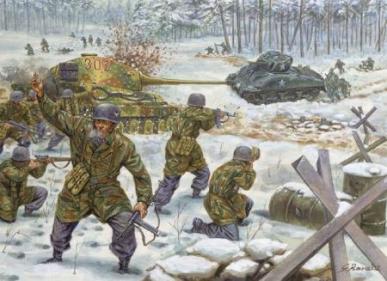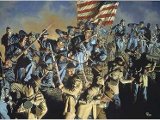Battle of the Bulge

By the mid-December 1944, Hitler was in a desperate position. The Allies were advancing in the West, while the Russians were swiftly approaching the German border. Instead of preparing to defend Germany from the forthcoming invasion, he decided to launch an offensive against the Allies in the West. The goal of the Ardennes Offensive was to break through the Allied lines at the Ardennes, a densely forested region in Belgium, France and Luxembourg, split the British and American forces, capture the city of Antwerp in Belgium, trap the Allied army and perhaps be able to negotiate a peace agreement with the West.
By winter of 1944, the German Field Marshal Gerd von Rundstedt secretly raised a force consisting of 38 divisions with about 250,000 men and 1,200 tanks at the Ardennes Forest. Hitler counted on total surprise and intentionally let the Allies (who were listening to the German communication through ULTRA) believe that he is raising troops to block the Allied advance. Even Field Marshal von Rundstedt himself allegedly believed that Hitler plans a defensive operation. Due to the inclement winter weather which prevented aerial reconnaissance, the Allies were completely unprepared for a large scale counter-offensive which started on December 16, 1944.
The German attack along the sixty-mile long line that was held by five divisions from the First US Army was a complete surprise. The American troops of about 83,000 men were mostly new divisions because the main force was preparing to cross the River Rur. Surprised by the offensive and confused by the English-speaking soldiers wearing American uniforms, about 7,500 men of the 106th Infantry Division surrendered. The Germans achieved a breakthrough in several locations but the offensive did not take place as smoothly and swiftly as expected.
The Allied lines held out in the north as well as in the south, while the 28th Infantry Division slowed the German advance in the center. The Germans were thus repulsed at both northern and southern flanks and unable to proceed as fast as planned due to the lack of roads. Therefore the capture of Bastogne, the key road junction was of vital importance, however, the American troops in the besieged town of Bastogne successfully resisted five German divisions. The Eight Corps commanded by Troy Middleton and 101th Airborne Division under the command of General Anthony McAuliffe refused the German demand to surrender Bastogne on December 22 despite appearing to be in a hopeless position.
Clearing of the weather on December 23 enabled the Allied air force to drop supplies and attack the enemy lines and the reinforcement were on their way to Bastogne. By December 24, the German advance came to an end and two days later, Bastogne was saved. The US First and Third Armies launched a counter-offensive on January 3, 1945, and converged at Houffalize on January 16. Fighting continued until January 28 when the Germans were finally pushed back to the line before December 16.
After the defeat at the Battle of Ardennes, the German forces were withdrawn to the defenses of the Siegfried Line. In addition to inflicting a heavy blow to the German morale, the failed Ardennes Offensive also depleted the German army of both men and equipment as well as allowed the Russians to advance in the east. The German casualties during the Ardennes Offensive remain unknown but it is estimated that about 100,000 Germans were killed, wounded or captured, while the Luftwaffe had been shattered. The Allied victory, however, was costly. About 89,500 men were killed, wounded or captured. Despite heavy casualties on both sides, the Battle of Ardennes was a major Allied victory and virtually destroyed any hope for German victory in the war as well as Hitler's hopes for a separate peace agreement with the West. Nazi Germany was on its knees and the Allied victory in World War II became only a matter of time.
The Malmedy Massacre
On December 17, the Germans shot 84 American soldiers who surrendered at the town of Malmedy in Belgium and some other Americans captured earlier. For unknown reason, the members of the Kampfgruppe Peiper (a combat union of the 1st SS Panzer Division) opened fire on about 150 American prisoners of war. Joachim Peiper, the commander of the unit and SS general Josef "Sepp" Dietrich were trialled for the murder of the American prisoners of war during the Ardennes Offensive as a part of the Dachau Trials in 1946.
Joachim Peiper was sentenced to death by hanging but his sentence was latter commuted to life imprisonment. However, he was released from prison at the end of 1956, after serving 11 years. SS general Sepp Dietrich who was charged for ordering the shooting of the American prisoners of war was sentenced to 25 years in jail because other German officers testified in his favor. But like Peiper, he did not served full time. Dietrich was released from prison after serving only 10 years.
73 men were trialled and found guilty for the Malmedy Massacre. Of 73 men who were found guilty for the war crime, 43 were sentenced to death by hanging, while the others were sentenced from 10 years to life imprisonment. Of 43 death sentences, 12 were commuted to life imprisonment after the Simpson Commission issued the report about accusations regarding torture of the defendants on September 14, 1948. In its report, the Commission recommended to commute death sentences to life imprisonment. For 31 men who were sentenced to death by hanging, the report, however, came too late.




